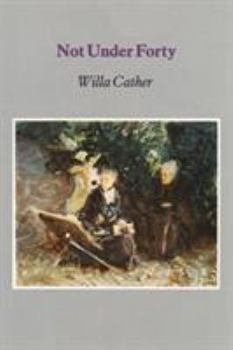Not Under Forty
Select Format
Select Condition 
Book Overview
For Willa Cather, "the world broke in two in 1922 or thereabouts." The whole legacy of Western civilization stood on the far side of World War I, and in the spiritually impoverished present she looked back to that. To that she directed readers of these essays, declaring that anyone under forty years old would not be interested in them. But she was wrong: since its first publication in 1936, Not Under Forty has appealed to readers of all ages who share Cather's concern for excellence, for what endures, in literature and in life.
Format:Paperback
Language:English
ISBN:0803263317
ISBN13:9780803263314
Release Date:November 1988
Publisher:University of Nebraska Press
Length:149 Pages
Weight:0.42 lbs.
Dimensions:0.4" x 5.3" x 8.0"
Customer Reviews
2 ratings
A glimpse of Cather's tastes in literature
Published by Thriftbooks.com User , 20 years ago
The six essays Willa Cather gathered into this small book in 1936 give the reader a good idea of her philosophy of literature and also provide anecdotes about several literary figures she admired or met during her career. She writes about Flaubert (or, more precisely, Cather's friendship with his niece), Mrs. James T. Fields (the widow of the co-owner of the famed publisher Ticknor and Fields), Sarah Orne Jewett, Thomas Mann, and Katherine Mansfield. An additional piece, entitled "The Novel Demeuble" (which might be translated as "The Novel Unplugged") objects to the excesses in the fiction written by her contemporaries.The title of the collection refers to Cather's lament that most of these writers would no longer be of interest to those then under forty years of age, and there is certainly an "old-fashioned," even prudish, stance throughout. She dismisses the realists for their "cataloguing of a great number of material objects, in explaining mechanical processes, the methods of operating manufactories and trades, and in minutely and unsparingly describing physical sensations. . . . Have such things any proper place in imaginative art?" Although she mentions only Balzac, she clearly has in mind such American writers as Dreiser, Lewis, and Upton Sinclair. And she has no brook for Lawrence, whose characters are "dehumanized by a laboratory study of the behavior of the bodily organs under sensory stimuli." Cather didn't always feel this way; thirty-five years earlier she wrote glowingly of Frank Norris (in an essay not included here), praising the descriptions of workaday environment in "McTeague" as "convincing proof of power, imagination and literary skill." Apparently, Cather eventually believed that the scales tipped too far toward realism--or her tastes simply changed.The most interesting, and breeziest, piece concerns Madame Grout, who was Flaubert's niece and lifelong correspondent (the "Caro" in his "Letters to My Niece Caroline"); Cather manages simultaneously to provide a touching account of this aging lady and to instill an increased appreciation of Flaubert's achievement. Probably the key to understanding Cather's work is her ode to Jewett, to whom she was much indebted and whose work she championed to the reading public throughout her life. The weakest essay, it must be noted, is Cather's review of Thomas Mann's "Joseph" novels. She did not live to see the fourth book published, so the essay was premature, and her judgment that these books were Mann's greatest is hard to support. (Dare I say that it would be far more fascinating to know what she thought of "Death in Venice"?) Even here, however, she captures Mann's essence--his "rich deliberateness which is never without intensity and deep vibration." All the essays, then, will provide Cather fans with a glimpse of the art underlying the fiction she herself published in the late 1920s and the 1930s--from "Death Comes for the Archbishop" to "Lucy Gayheart."
Cather's essays are as sublime as her novels
Published by Thriftbooks.com User , 25 years ago
William Gass recently observed that participants in contemporary writing workshops are not interested in literature. They are interested in writing, in "expressing a self as shallow as a saucer." Willa Cather was interested in literature, in art, in permanence, and the essays in Not Under Forty memorably illustrate her beliefs. Her seriousness and integrity are very much needed in an era when acclaimed young novelists use their acknowledgements to thank Mom for reading their manuscripts and correcting their punctuation.






